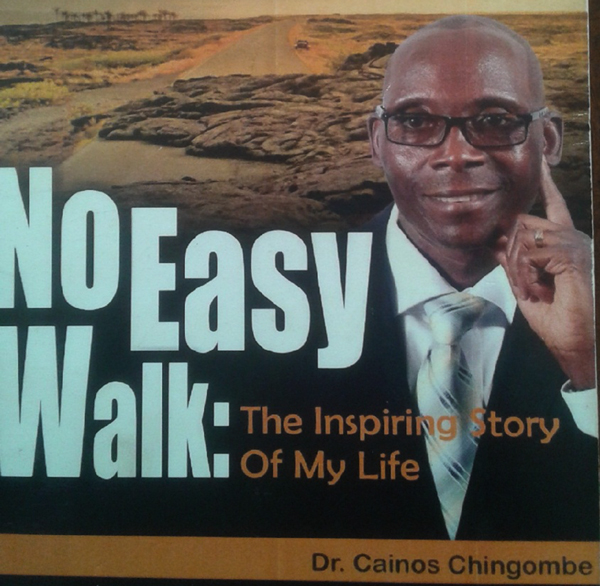
Title: No Easy Walk (The Inspiring Story of My Life) Author: Cainos Chingombe Publisher: Canonbury, Harare (2017) ISBN: 978-0-7974-7367-6
REVIEW BY RAPHAEL GWIZO
CAINOS Chingombe’s autobiography, No Easy Walk: The Inspiring Story of My Life, appears to be the answer to critics of the modern-day motivational literary cannon. In various fora, authors of motivational books have been rapped for “preaching theory” and criticised heavily for vacillating in long articles without life experiences to throw some weight behind their claims.

After reading this book one is, no doubt, left convinced that motivation is more meaningful in application than in theory. Motivational columns occupy acres of space in local dailies with erudite tomes of jargon and success concepts but critics simply want to see the practicality of the concepts demonstrated.
Readers, too, want to see the persistence and the highly preached about determination in practice. And this is precisely what Chingombe’s book is about. No Easy Walk: The Inspiring Story of My Life is about the power of persistence.
In fact, the book, as reviewed on the cover, could have been titled The Power of Persistence. This book tells the story of a man, who was born in a large but disadvantaged family, eking out a living right on the margins of mainstream society, and could barely finish primary school. Born to peasant parents in rural Buhera, Chingombe had to work in several rural compounds herding cattle to sustain himself and this was never easy.
His childhood could be a chronicle of hard labour, as he had had to do a string of degrading and menial jobs without pay.
- Chamisa under fire over US$120K donation
- Mavhunga puts DeMbare into Chibuku quarterfinals
- Pension funds bet on Cabora Bassa oilfields
- Councils defy govt fire tender directive
Keep Reading
Feeding pigs at one time and coming to the then Salisbury to work as a general hand in menial jobs, he had to contend with that kind of rough living. At one time, he recalls staying under Mukuvisi Bridge, as he was not allowed to stay with a brother at Matererini flats in Mbare under the colonial regime of Ian Smith.
Tired of menial jobs and substandard living, a youthful Chingombe traced his roots back to his rural home in Buhera, where, despite advancing age, he had to start schooling again beginning in primary. The account documents how he struggled all the way despite financial constraints until he completed his schooling.
His determination saw him working during holidays to pay fees. One theme that runs throughout the autobiography is persistence. Chingombe did not allow obstacles in his path to break him. The book captures motivational concepts in reality because Chingombe, at one time, was dissuaded from continuing with education because of the intensifying war, but he soldiered on, finally completing his education and becoming a teacher as his first profession.
This was such a huge transformation from someone who used to herd cattle and his story demonstrates that with determination, all things are possible. From there he would strive to do a number of courses, ultimately getting a first degree, numerous diplomas, a master’s degree and two doctorate degrees.
The man is the personification of what can be achieved by a determined effort to transform one’s life.
The book will practically motivate anyone. As I read this book, I could sense a new kind of motivational writing, largely unexplored, which is aimed at giving life to motivation concepts so much preached in theory.
The book is written in exciting, artful and easy-to read-style. It could easily prove to be the beginning of a new kind of motivation wave far from scores of motivational books that fill the shelves in the book shops.
There are more positives from the autobiography even detailing his contribution to Zimbabwe 1970s liberation struggle that would usher in independence in 1980 and the tough times of his life.
The book is filled with experiences of friends of the author. I found this sometimes a little less necessary. But again perhaps this strengthens the tone of the autobiography and captures the life of the author in depth. The book will surely be a reply to critics of theoretical motivation books.











